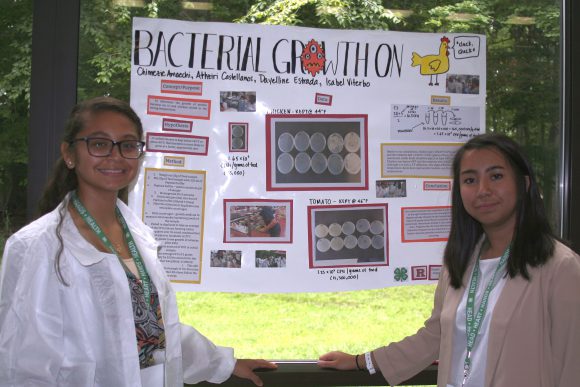
Summer Science Students.
Annual 4-H Summer Science Program was held July 11-15 on the Cook Campus
Over sixty high school students from Elizabeth, Newark, New Brunswick, Passaic, Paterson, Trenton, Rahway and Atlantic City participated in hands-on STEM (science, technology, engineering and mathematics) activities alongside Rutgers faculty at the 8th annual 4-H Summer Science Program on the Rutgers-New Brunswick campus.
“The students spent a week with Rutgers scientists–touring their labs, learning about their research, and how their scientific inquiry is relevant to our daily lives,” said Chad Ripberger, Rutgers Cooperative Extension (RCE) 4-H agent, Mercer County. And because the students were living on campus, they also got a taste of university life.
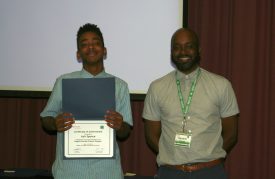
2016 4-H Summer Science participants from Atlantic County.
Sammy Fonseca, one of the participants of the program, said that this was her first overnight visit to a college campus. “It was pretty amazing! I didn’t realize science involved so much and that there were so many opportunities to explore. It has always been one of my favorite subjects and, after this week, I am much more confident!”
The high schoolers performed experiments and even identified a variety of marine life as part of a seining activity at Sandy Hook. They also got to work on their own projects ranging from the effects of super storm Sandy on trees to bacterial research on food microbial growth and presented them on the final day to parents, faculty and 4-H staff before a celebratory luncheon at the Cook Student Center.
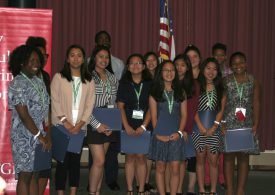
2016 4-H Summer Science participants from Essex County.
Participants must have completed their freshman year in high school. Selection is based on teacher recommendations and participation in an extensive application process that includes writing an essay and interviews by local 4-H staff. As a condition for participating in the program, these young people become 4-H SET Ambassadors, providing a minimum of 50 hours of service to their local 4-H program, sharing their experiences and knowledge with other young people and working with 4-H staff in their communities.
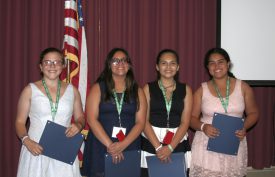
2016 4-H Summer Science participants from Hudson County.
The annual Rutgers 4-H Summer Science Program began in 2009 with the objective of encouraging young people to participate in and gain a better understanding of opportunities available in STEM through a series of interactive activities.
“Part of the growing 4-H youth development mandate is to prepare and empower our youth to get involved in a career in science,” said Ripberger. “Several years ago, a series of national reports sounded alarm bells among youth development specialists about the need to engage our youth in science and technology, across all backgrounds, but especially in our urban communities.”
While the overall objective of 4-H has always been the development of youth as individuals and as responsible and productive citizens, the 21st century model of 4-H has expanded to serve a variety of communities, including specific programming for urban youths.
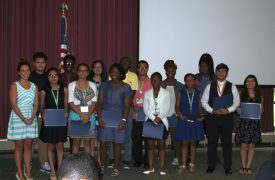
2016 4-H Summer Science participants from Mercer County.
Janice McDonnell, 4-H Science Engineering & Technology (SET) agent and co-founder—along with Ripberger—of the Summer Science Program, explained that National 4-H unveiled SET as a critical part of its mandate and said that RCE has been playing a larger, vital role in creating both interest and competency in these areas.
Once students finished their presentations, Larry Katz, RCE director, congratulated the students, scientists and parents for a successful week. He addressed these bright, inquisitive high school students, encouraging them to continue to pursue their interest in science and follow their passions all the way to a Rutgers degree at the School of Environment and Biological Sciences!
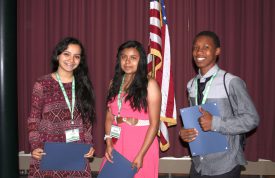
2016 4-H Summer Science participants from Middlesex County.
Everyone was then treated to lunch but the real treat followed with keynote speaker Navarrow Wright, vice president of Engineering for Reelio. This was Wright’s fifth time speaking to the summer science participants and he did not disappoint, firing up the students and luncheon attendees alike with his call to “change (their) default position;” to not accept the status quo, because science does not accept the default position.
Wright spoke about the need to always question and to try to look at a problem or issue in a unique and different way, citing the examples of businesses like Uber and Airbnb. He charged the students with taking responsibility for their futures, choosing hard work and education over instant gratification. He urged them to learn to code, to create apps, to seek out resources to market themselves and to find unique ways to follow their dreams.
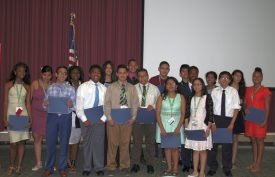
2016 4-H Summer Science participants from Passaic County.
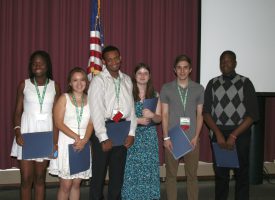
2016 4-H Summer Science participants from Union County.

